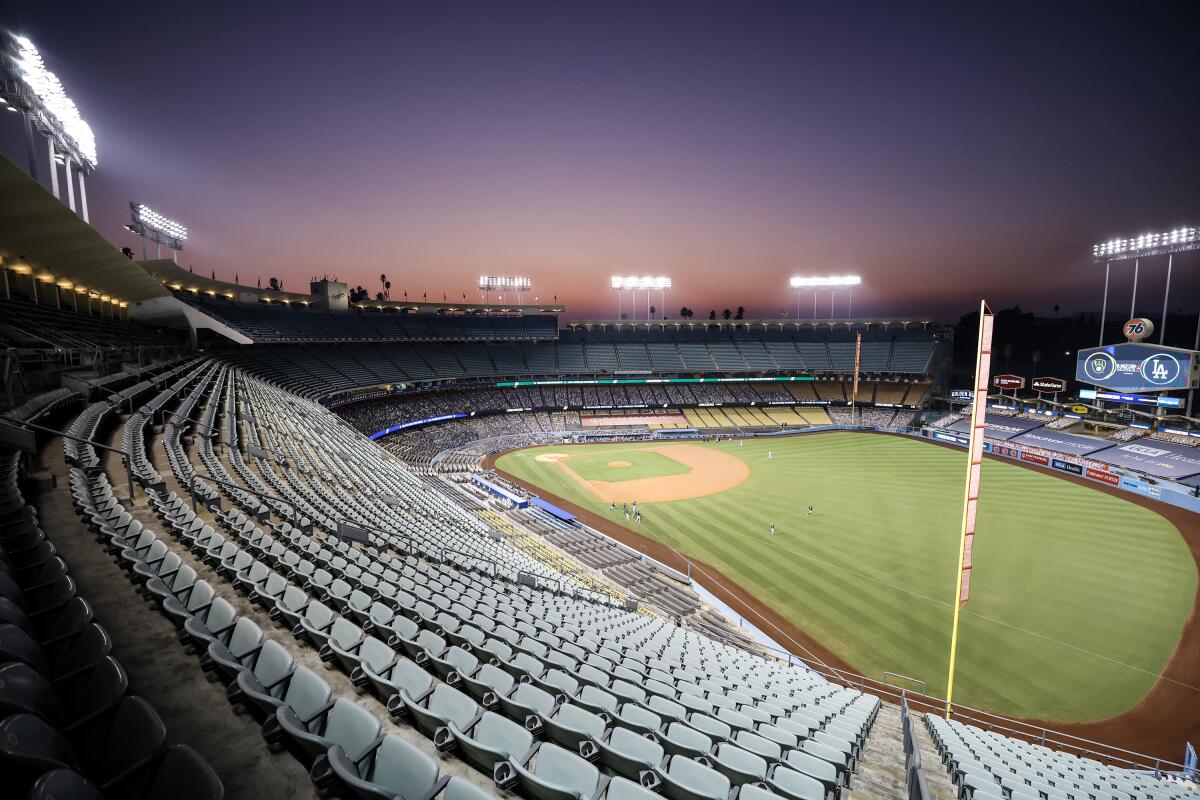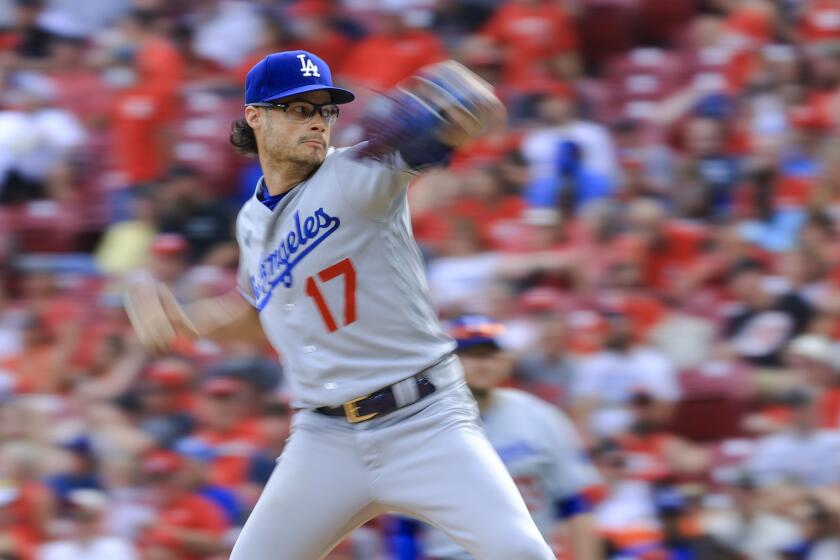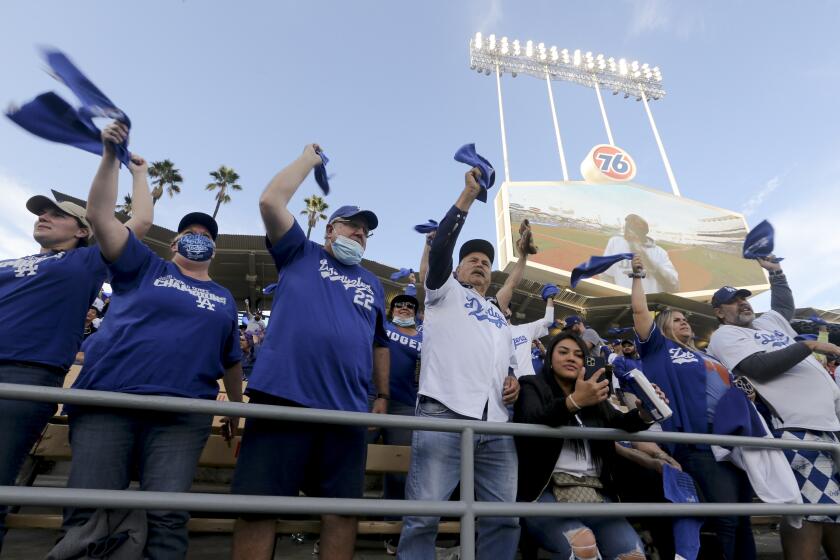It should be time for Dodger baseball. Thanks to the MLB lockout, we have to wait

- Share via
When I started watching baseball regularly in 2017, it was in part because I needed a schedule. As a freelance writer in Los Angeles, I had trouble figuring out when I could call it quits for the day, especially in the summer when the sun was still up at 6, 7 and 8 o’clock. The metronomic quality of a baseball schedule helped: I worked until it was time to turn on the Dodgers.
For the millions of fans like me who tune into the sport annually, baseball isn’t just a game, a pastime or a hobby: It’s a signal of seasonal change, of days getting longer and warmer, afternoons expanding into evenings on which it feels reasonable to put down our labors to sit and watch a game that doesn’t affix itself to the demands of the clock.
But lately, a series of escalating countdowns is all the sport has offered us. In the weeks that followed the Atlanta Braves’ Nov. 2 World Series win over the Houston Astros, there was a flurry of free agent activity. Then, just before midnight Eastern time on Dec. 1, the collective bargaining agreement between Major League Baseball and the MLB Players Assn. expired without a new agreement in place. The league preemptively locked the players out, igniting the first work stoppage the sport had seen in more than 20 years.
Joe Kelly, a World Series champion with the Red Sox and the Dodgers, asks fans to remember the beauty of baseball even as the sport is in a lockdown.
Since then fans have been counting weeks and then days, trying to figure out when negotiations between the two parties would have to end for spring training games to begin as scheduled on Feb. 26. On Feb. 23 the league announced that if an agreement wasn’t in place by midnight on Feb. 28, they would begin canceling games. Now, the first two series of the regular season have been unliterally canceled by MLB. Bargaining sessions are ongoing, but it’s unclear if or when we can expect the season to begin again.
This is bad for baseball and the people who love it. While baseball’s stars can make hundreds of millions of dollars, many other players are only recently out of the minor leagues, where they were paid less than minimum wage for their work. Stadium employees and small businesses that rely on spring training tourism are in a similar position, which is especially brutal after the COVID-19 pandemic eliminated many of those jobs during the 2020 season.
Budding fans are less likely to absorb baseball as part of the rhythm of their lives, and may fall in love with something else instead — not a tragedy, but a loss all the same.
None of this touches on how disappointing it’s been to watch MLB allegedly try to “break” the Players Assn. by squabbling with them over what amounts to crumbs to a group of billionaire owners. Of course, this is a business, but watching baseball get reduced to greedy haggling over a bottom line is gutting for fans like me.
Thanks to stubborn owners, the MLB lockout will see fans lose seats, ushers and concessionaires lose livelihoods, and TV viewers lose a companion.
After the revelation that the Astros had cheated in the 2017 World Series, potentially robbing the Dodgers of a win, there was a lot of conversation among fans about “what ifs.” When the team finally did win the title in 2020, celebrations— already limited by the pandemic — were intermingled with memorials for those who didn’t live to see the victory happen. It was a stark reminder of how personal sports fandom is — how it is passed down through generations and spreads out through friend groups, binding people together across busy lives.
On the July opening day of the truncated 2020 season, my baseball group texted and toasted one another through our screens at the first pitch. It’s a complicated memory — the pandemic made me lonely and scared, uncertain that a baseball season was a good idea for teams or their employees. It was also an important moment, one that strengthened the bonds between me and the friends I drank that beer with. I’ll never forget how baseball helped us keep in touch during some of our most difficult days.
Now we text each other links to baseball writers excoriating the league’s behavior and the best player quotes from each day (ex-Dodger Ross Stripling: “…it was like they think we’re dumb baseball players and we get sleepy after midnight or something.”) Our friendships will survive this work stoppage, as will the sport, but it’s hard not to feel like my relationship to the game will always be tarnished by what I’ve witnessed this off-season.
Baseball is a game that unfolds luxuriously in time, taking up as much of it as it needs. I wish MLB understood that money is always being earned and spent, but the time they’re wasting now is precious precisely because none of us — owners, players, fans — will ever get it back.
Zan Romanoff is the author of three young adult novels and a journalist in Los Angeles. @zanopticon
More to Read
A cure for the common opinion
Get thought-provoking perspectives with our weekly newsletter.
You may occasionally receive promotional content from the Los Angeles Times.











